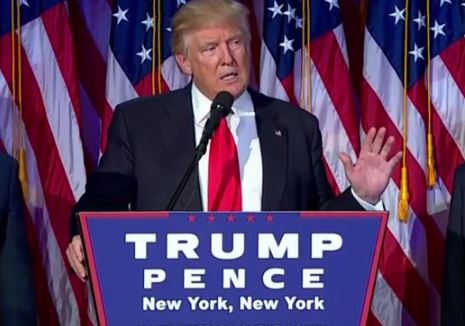Trump elected president: what now for pharma?

The world has woken up to a new era, with Donald Trump elected as US president – a huge victory for a political outsider and the 'silent majority' who felt sidelined by the status quo.
While a small majority of US voters is celebrating, the country has been badly divided by a bitter election campaign. Many who voted for Hillary Clinton are fearful that Trump will deliver on his many populist promises, including a ban on all Muslims entering the country, trade wars with China and Mexico, the repeal Obamacare.
Like many in big business, the pharma industry had given more backing to Clinton, despite her anti-pharma policies - and now wait to see how the political upheaval will affect them.
Hillary Clinton had been making waves with her sharp criticism of drug pricing, and strong campaigning against price gouging by pharma – but the industry may not get an easy ride from Trump, either.
In a health policy document, Trump said surprisingly little about drug pricing, although he did say he wanted to allow cheaper drugs to be imported to reduce medicine costs.
But Trump did make a clear pledge to repeal the Affordable Care Act, the expansion of health insurance coverage which was one of President Obama's proudest achievements.
However many middle-class citizens had suffered an increase in premiums caused by Obamacare, and Trump has promised to repeal the legislation “on day one” of his administration.
But in his primary campaign, Trump said that he would renegotiate prices that the Medicare social insurance programme for older people pays for drugs.
Medicare is legally unable to negotiate lower prescription prices with pharma companies, and Trump will likely need a new law to introduce this policy.
Trump also highlighted the lobbying powers of drug companies, which is ironic given that the industry traditionally relies on sympathetic politicians from Trump’s Republican party to influence the political process.
The Republicans have retained control of both the House of Representatives and the Senate, meaning Trump could have more freedom to implement his policies - if he and the Republican party can stay on friendly terms.
The election result could also have ramifications this side of the Atlantic, as the UK prepares for Brexit.
Yesterday Donald Trump’s trade adviser, Dan DiMicco, said Britain will be offered a free trade deal before the rest of the European Union ahead of his election victory, offering the possibility of a welcome political and economic boost after this year's upheavals.
Although Trump’s victory sent the dollar sliding on currency exchanges, pharma stocks outside of the US ticked up.
GlaxoSmithKline, AstraZeneca and Sanofi all made small gains, suggesting that Trump’s election could be seen as a let-off for the industry.
While the ramifications of Trump's victory are still not certain, there was some clearly good news for pharma in California, where voters decided against Proposition 61. This would have introduced new powers to negotiate prices direct with the industry at state level, but heavy funding from pharma has helped to persuade voters to reject the idea.
Whatever the next four years of a Trump presidency bring, pharma knows its current pricing model is unsustainable. Ongoing investigations by US authorities into pricing tactics of companies such as Mylan, means the industry is already looking to change to its approach. Whether a Trump administration will support or move against the sector is yet to be seen.











